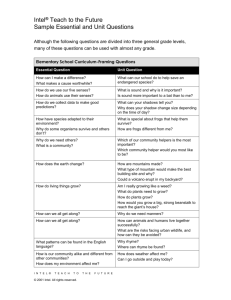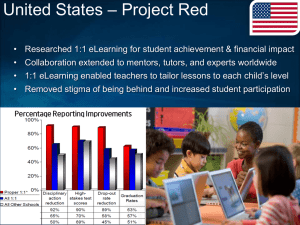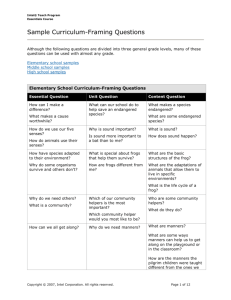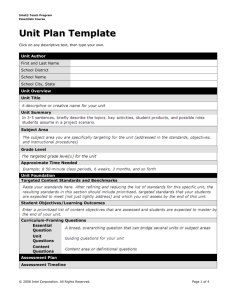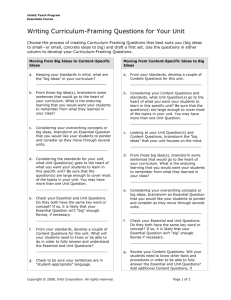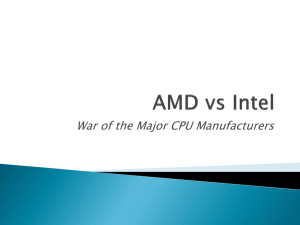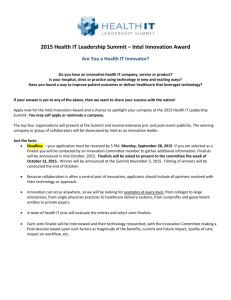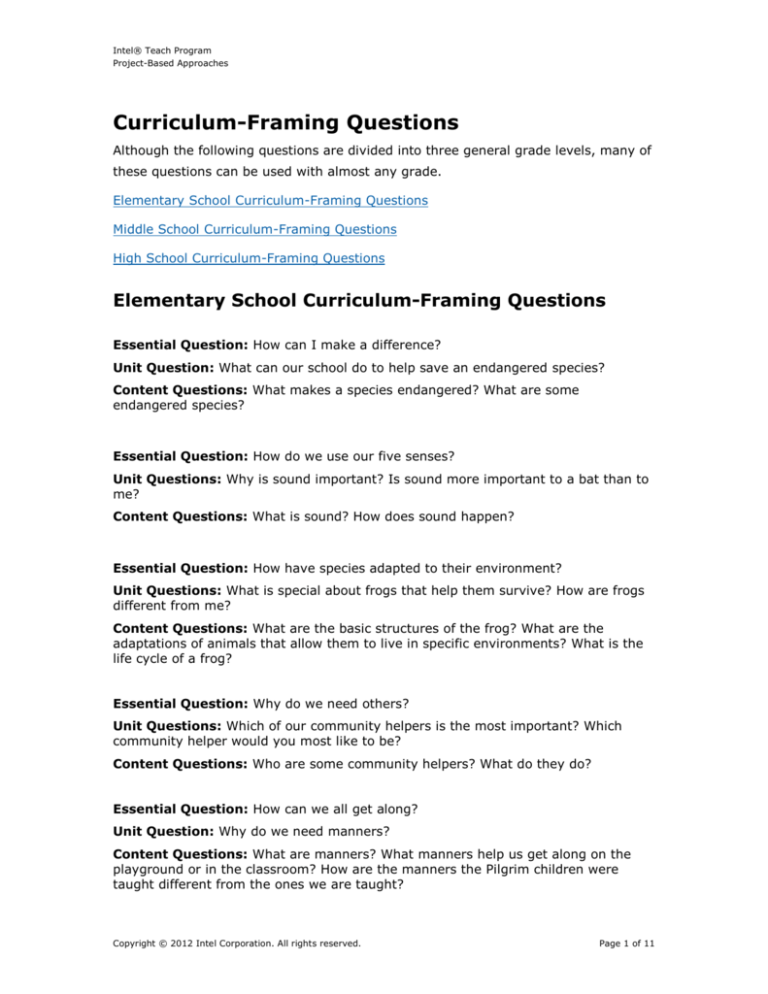
Intel® Teach Program
Project-Based Approaches
Curriculum-Framing Questions
Although the following questions are divided into three general grade levels, many of
these questions can be used with almost any grade.
Elementary School Curriculum-Framing Questions
Middle School Curriculum-Framing Questions
High School Curriculum-Framing Questions
Elementary School Curriculum-Framing Questions
Essential Question: How can I make a difference?
Unit Question: What can our school do to help save an endangered species?
Content Questions: What makes a species endangered? What are some
endangered species?
Essential Question: How do we use our five senses?
Unit Questions: Why is sound important? Is sound more important to a bat than to
me?
Content Questions: What is sound? How does sound happen?
Essential Question: How have species adapted to their environment?
Unit Questions: What is special about frogs that help them survive? How are frogs
different from me?
Content Questions: What are the basic structures of the frog? What are the
adaptations of animals that allow them to live in specific environments? What is the
life cycle of a frog?
Essential Question: Why do we need others?
Unit Questions: Which of our community helpers is the most important? Which
community helper would you most like to be?
Content Questions: Who are some community helpers? What do they do?
Essential Question: How can we all get along?
Unit Question: Why do we need manners?
Content Questions: What are manners? What manners help us get along on the
playground or in the classroom? How are the manners the Pilgrim children were
taught different from the ones we are taught?
Copyright © 2012 Intel Corporation. All rights reserved.
Page 1 of 11
Intel® Teach Program
Project-Based Approaches
Essential Question: What patterns can be found in the English language?
Unit Questions: Why rhyme? Where can rhyme be found?
Content Questions: What is a rhyme? What are some popular nursery rhymes?
What is a limerick?
Essential Question: What is the price of life?
Unit Questions: Are all animals worth protecting? If you were an African animal,
which one would you most like to be and why?
Content Questions: How do animals in Africa adapt to their environment? What do
African animals need to survive? What are the characteristics of African animals?
Essential Question: What’s your story?
Unit Question: How does the way an author writes (style) make a story more
interesting?
Content Questions: What are the elements of a story? What is the 6+1 Trait*
Writing process? What traits of writing does the author use?
Essential Question: Does accuracy really matter that much?
Unit Questions: How are fractions used on the job, and are they needed to get the
job done right? How can understanding fractions make your life easier?
Content Questions: What is a fraction? How do you add, subtract, multiply, and
divide fractions? What are numerators and denominators? How do you change a
mixed numeral into an improper fraction?
Essential Question: How do I get from here to there?
Unit Questions: How do I decide which route to take? What can maps tell us about
people, places, and environments?
Content Questions: What symbols and location identifiers are found on a map, and
what do they mean? How do you measure using a map?
Essential Question: How can we make a difference?
Unit Questions: What can our school do to help save an endangered species? How
can humans and endangered species share a region?
Content Questions: What makes an animal an endangered species? What is
needed in your species’ habitat?
Essential Question: Are you prepared?
Unit Questions: Can I go outside and play today? How should I prepare for the
weather today?
Content Questions: Where does rain come from? What causes the seasons of the
year? What are some things people do to prepare for different weather conditions?
Copyright © 2012 Intel Corporation. All rights reserved.
Page 2 of 11
Intel® Teach Program
Project-Based Approaches
Essential Question: Where can we find order and patterns?
Unit Questions: Is it time to rhyme? Why rhyme?
Content Questions: What is rhyme? What words sound the same? How can you tell
words that rhyme?
Essential Question: Why change?
Unit Questions: Could a volcano erupt in my backyard? What type of mountain
would make the best building site and why?
Content Questions: What are the layers of Earth? What are three types of
volcanoes? How are mountains made? How do we know that a volcano is dormant?
Essential Question: Is there such a thing as happily ever after?
Unit Questions: Why is Cinderella a favorite story all over the world? How would
the Cinderella fairy tale change if a different character told the story?
Content Questions: What are the elements of a fairy tale? What is point of view? In
what ways are all of the Cinderella stories from around the world similar?
Essential Question: What changes do you see?
Unit Question: What can shadows tell us?
Content Questions: What causes a shadow? How do you measure your shadow?
What causes your shadow to change?
back to top
Copyright © 2012 Intel Corporation. All rights reserved.
Page 3 of 11
Intel® Teach Program
Project-Based Approaches
Middle School Curriculum-Framing Questions
Essential Question: What does it take to change the world?
Unit Questions: What impact did early explorers have on the development of
America and their home country? How did early explorers change the world?
Content Questions: Who are some of the early explorers? Where did these
explorers go? What did they find?
Essential Question: How can we all get along?
Unit Questions: Are rainforests worth saving? How do people and animals live in
rainforests, and how can they best coexist?
Content Questions: What is a rainforest? What lives in a rainforest? Where are
rainforests located?
Essential Question: Where does energy come from?
Unit Question: How can we use natural resources to create energy?
Content Questions: What are natural resources? What are natural resources used
for? What are the differences between renewable and nonrenewable resources? What
are some examples of each?
Essential Question: Why is water important?
Unit Questions: Are the world’s ponds healthy? What makes a healthy pond?
Content Questions: What are the components of a pond? What is the optimum pH
level of a pond to support aquatic life?
Essential Question: How can I be healthy?
Unit Questions: What can I do to reduce health risks? How do the systems of the
body work together to keep me healthy?
Content Questions: What are some health risks? Why are they considered health
risks?
Essential Question: Why are people always on the move?
Unit Questions: Where is the best place to live? Why do immigrants give up
everything to go to a strange country?
Content Questions: What is an immigrant? Why did the ________ leave
________? Why is America called a melting pot?
Copyright © 2012 Intel Corporation. All rights reserved.
Page 4 of 11
Intel® Teach Program
Project-Based Approaches
Essential Question: What makes something “alive”?
Unit Questions: What is special about a cell? What can cells tell us about the
organization of other systems?
Content Questions: What are the features of a cell? What are the stages of cellular
respiration in a human cell? What are the differences between an animal and plant
cell?
Essential Question: How does the past affect the future?
Unit Question: How is ancient Egypt still with us today?
Content Questions: What was the political structure of ancient Egypt? What were
some customs of ancient Egypt?
Essential Question: How can one live beyond one’s time?
Unit Questions: Which of Leonardo da Vinci’s areas of expertise had the most
impact on today? How was Leonardo da Vinci an inspiration for the future?
Content Questions: What is Leonardo da Vinci famous for? Who were the patrons
of Leonardo da Vinci?
Essential Question: How do systems of government affect the individual?
Unit Questions: What impact did the feudal system have on a person’s overall
quality of life during the Middle Ages? What feudal character would you have liked to
have been during the Middle Ages?
Content Questions: What was the feudal system like in the Middle Ages? Who were
some of the important people in the feudal system?
Essential Question: How does conflict produce change?
Unit Question: How is our life different today because of _____ conflict?
Content Question: What were the causes and results of the ______ war?
Essential Question: Where do stories come from?
Unit Question: How much does Greek and Roman mythology influence literature
and our everyday life?
Content Question: Who are some of the gods in Greek and Roman mythology, and
what are their attributes?
Essential Question: What makes a community?
Unit Question: How does community history affect today’s community values?
Content Questions: When was our community founded and by whom? What are
some laws we have in our community? What are some problems in our community?
Copyright © 2012 Intel Corporation. All rights reserved.
Page 5 of 11
Intel® Teach Program
Project-Based Approaches
Essential Question: How does music reflect history, society, and culture?
Unit Questions: How do the times in which a composer works affect his or her
music? How do composers from different eras compare?
Content Questions: Who were some famous composers from different time periods
and countries? What are some musical styles?
Essential Question: Why explore?
Unit Question: What can we learn from the experiences of the early explorers that
is useful in modern times?
Content Questions: What motivated the Spanish and Portuguese explorations?
Who and what events were significant in the exploratory voyages of the 14th through
16th centuries?
Essential Question: Have things really changed that much?
Unit Question: Is our life anything like that of the ancient Egyptians?
Content Questions: Why was the river Nile so important to the ancient Egyptian
civilization? What religious, cultural, and scientific contributions were established by
the ancient Egyptians?
Essential Question: Why is learning from our past important?
Unit Questions: Could we live some place other than Earth? How can we conserve
and maintain a planet’s natural resources?
Content Questions: How does acid rain travel through the water cycle, and what
dangers does it pose? What affect does pH have on our water quality and aquatic
life? What is ozone? What is causing the destruction of the Earth’s ozone?
Essential Question: How do the choices we make now affect us later?
Unit Questions: Is disease inevitable? Is prevention really the best medicine? What
is the diagnosis? How can you be sure it is correct?
Content Questions: What are the functions and weaknesses of each of the body
systems? What is the definition of disease? What benefits do we get from exercise?
Essential Question: How can math help me understand my world?
Unit Question: Why use the metric system?
Content Questions: How do you use the metric system to measure things? What
are the different metric measurements?
Copyright © 2012 Intel Corporation. All rights reserved.
Page 6 of 11
Intel® Teach Program
Project-Based Approaches
Essential Question: What changes do you see?
Unit Questions: Why are rocks and minerals important to us? Why look further than
your own backyard?
Content Questions: What are igneous, sedimentary, and metamorphic rocks? How
are different rocks formed? What is the rock cycle?
back to top
Copyright © 2012 Intel Corporation. All rights reserved.
Page 7 of 11
Intel® Teach Program
Project-Based Approaches
High School Curriculum-Framing Questions
Essential Question: What can we learn from music?
Unit Questions: What does the music of today tell about us? How does a
composer’s life influence his or her music? What does the music from the 60s say
about its time period and culture?
Content Questions: Who were some composers of the 60s? Who were some
famous composers of the past and present?
Essential Question: What does it take to change the world?
Unit Questions: How did the policies or actions of Abraham Lincoln affect America
in the 1860s? How do the policies and actions of Abraham Lincoln affect your life
today?
Content Question: What were some of the policies or actions of Abraham Lincoln
that were important in his lifetime?
Essential Question: How can we respond to human suffering in ways that promote
dignity?**
Unit Questions: Does society have a responsibility to treat diseases? What are our
individual roles in their prevention, containment, and treatment?**
Content Questions: What are some common diseases in the world today? How are
diseases treated?
Essential Question: How can I use logic to find new properties and relationships?
Unit Question: How can geometry help me understand the world around me?
Content Questions: How do you calculate the square footage of a given room in
order to buy the right amount of carpet? When playing golf, how can knowing the
angles of incidence and reflection help you to make a hole in one? How does a GPS
unit locate coordinates?
Essential Question: Am I my brother’s keeper?
Unit Questions: What can we do to help those in need? Can famine be prevented?
Content Questions: What are some of the causes of famine in ________? What
kind of relief efforts are currently underway in _____?
Essential Question: Can one person make a difference?
Unit Questions: How have individuals impacted our history? Who is the greatest
American president?
Content Question: What are the accomplishments of _______?
Copyright © 2012 Intel Corporation. All rights reserved.
Page 8 of 11
Intel® Teach Program
Project-Based Approaches
Essential Question: How can we harness the Earth’s power?
Unit Question: Where else can we get electricity?
Content Questions: What is electricity? How does electricity work?
Essential Question: How can I get what I want?
Unit Questions: When you decide to buy a house, how do you choose the right
home for you? How can you plan for the future to ensure you will be able to afford
the home and lifestyle of your dreams?
Content Questions: How does financing affect the actual price paid for a home?
What factors determine how much home one can afford? How do regional factors
affect home prices? How do loans work?
Essential Question: Why is the universe the way it is?
Unit Questions: What is the physics behind the stars? What can we learn about
ourselves by studying the galaxy?
Content Questions: What makes up the galaxies? What are stars? How can we
know how far a star is from Earth?
Essential Question: Where do stories come from?
Unit Question: How much does history influence literature?
Content Questions: Where did ________ get his or her stories? What was the
political and social environment during the time of the metaphysical poets?
Essential Question: Just because we can, should we?
Unit Questions: Can science, discovery, and invention go too far? Should we put
limitations on science?
Content Question: What are some important scientific discoveries of the past 20
years?
Essential Questions: Why do laws change? When should laws change?
Unit Questions: Are 200-year old laws still relevant today? What laws, national or
local, may be challenged sometime in the future?
Content Question: What were the laws our country was founded on?
Essential Question: How does conflict produce change?
Unit Question: Why do humans often react to conflict with violence?
Content Questions: In Lord of the Flies, how do the characters respond to conflict?
What is the climax of the conflict and the story?
Copyright © 2012 Intel Corporation. All rights reserved.
Page 9 of 11
Intel® Teach Program
Project-Based Approaches
Essential Question: Does personal freedom exist?
Unit Question: Does our Constitution really protect our rights?
Content Question: How has the Constitution of the United States changed from its
inception to the present?
Essential Question: How does art reflect or change culture?
Unit Questions: How does impressionist art represent life in the late 1800s? How
did impressionist art change society in the late 1800s? How does your own art reflect
your life?
Content Question: Who were the famous artists of the impressionist movement?
Essential Question: How can history predict our future?
Unit Questions: How do wars start, and can they—and should they—be prevented?
Who benefits from war?
Content Questions: What countries were involved in WWII? Which countries were
aligned together? What are some significant events of WWII? What were the major
provisions of the Treaty of Versailles?
Essential Question: Does democracy result in effective, representative, and
humane governance?**
Unit Questions: Should the public vote on complex policy issues? What connections
are there between wealth and political power?**
Content Questions: What are the essential differences between a democracy and a
monarchy? What was the attitude of most delegates to the United States
Constitutional Convention in 1787 toward the development of political parties?
Essential Question: What is the difference between genius and madness?
Unit Question: What makes good music, art, or poetry?
Content Questions: Why was the artwork of Vincent van Gogh and Wassily
Kandinsky considered controversial or “bad” during their lives by the public, the art
critics, and their contemporaries? How has public opinion about the art of Vincent
van Gogh changed over time?
Essential Question: Why are you the way you are?
Unit Question: Environment or DNA, what influences our individuality?
Content Questions: What does DNA stand for? What are the four chemical bases
that make up DNA? Why do no two people look exactly alike?
Copyright © 2012 Intel Corporation. All rights reserved.
Page 10 of 11
Intel® Teach Program
Project-Based Approaches
Essential Question: Why have stories always been important throughout history?
Unit Questions: Why do we still read Shakespeare? How do Shakespeare’s poems
and plays impact and accurately reflect modern life? How is Shakespeare’s work
relevant to my life?
Content Questions: How does the author reveal the character of Hamlet to the
audience? What are Hamlet's external and internal conflicts? Why does Hamlet feign
madness?
Essential Question: Do politics affect science?
Unit Question: What really is happening to our environment?
Content Question: What are some of the environmental problems that are
occurring in our country today?
Essential Question: Are there scientific discoveries that should not be pursued?**
Unit Question: What is the big deal about cloning?
Content Questions: What is cloning? How does cloning work?
Essential Question: How does your opinion matter?
Unit Questions: What can polls tell us? Why can polls be interpreted in many ways?
Content Questions: What are demographics, and how do candidates use them to
target voters? What are the steps in creating and conducting a poll?
Essential Question: Is a picture worth a thousand words?
Unit Questions: How can photographs help us interpret the past? How does
photojournalism impact public opinion?
Content Question: What is one rule of composition, and how is it applied to
photography?
Essential Question: What makes a leader great?
Unit Questions: What was the impact of conquest on the ancient world? What effect
did empires have on daily life in the ancient world?
Content Question: What were the accomplishments of your historical figure?
Essential Question: How can we harness the Earth’s power?
Unit Questions: Why is electricity important? How is electricity used on the job?
Content Questions: What is electricity? What are the parts of an electric circuit?
What is Ohm’s Law?
**Some questions are from Katherine G. Simon’s article, “The Blue Blood Is Bad, Right?”
back to top
Copyright © 2012 Intel Corporation. All rights reserved. Intel, the Intel logo, Intel Education Initiative,
and the Intel Teach Program are trademarks of Intel Corporation in the U.S. and other countries.
*Other names and brands may be claimed as the property of others.
Page 11 of 11

